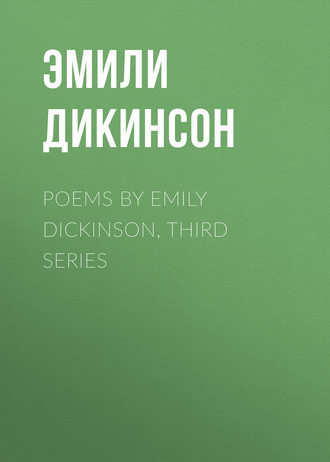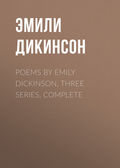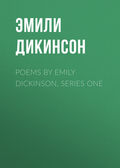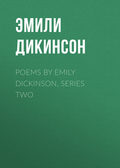полная версия

Эмили Дикинсон
Poems by Emily Dickinson, Third Series
XXI
Few get enough, – enough is one;
To that ethereal throng
Have not each one of us the right
To stealthily belong?
XXII
Upon the gallows hung a wretch,
Too sullied for the hell
To which the law entitled him.
As nature's curtain fell
The one who bore him tottered in,
For this was woman's son.
''T was all I had,' she stricken gasped;
Oh, what a livid boon!
XXIII.
THE LOST THOUGHT
I felt a clearing in my mind
As if my brain had split;
I tried to match it, seam by seam,
But could not make them fit.
The thought behind I strove to join
Unto the thought before,
But sequence ravelled out of reach
Like balls upon a floor.
XXIV.
RETICENCE
The reticent volcano keeps
His never slumbering plan;
Confided are his projects pink
To no precarious man.
If nature will not tell the tale
Jehovah told to her,
Can human nature not survive
Without a listener?
Admonished by her buckled lips
Let every babbler be.
The only secret people keep
Is Immortality.
XXV.
WITH FLOWERS
If recollecting were forgetting,
Then I remember not;
And if forgetting, recollecting,
How near I had forgot!
And if to miss were merry,
And if to mourn were gay,
How very blithe the fingers
That gathered these to-day!
XXVI
The farthest thunder that I heard
Was nearer than the sky,
And rumbles still, though torrid noons
Have lain their missiles by.
The lightning that preceded it
Struck no one but myself,
But I would not exchange the bolt
For all the rest of life.
Indebtedness to oxygen
The chemist may repay,
But not the obligation
To electricity.
It founds the homes and decks the days,
And every clamor bright
Is but the gleam concomitant
Of that waylaying light.
The thought is quiet as a flake, —
A crash without a sound;
How life's reverberation
Its explanation found!
XXVII
On the bleakness of my lot
Bloom I strove to raise.
Late, my acre of a rock
Yielded grape and maize.
Soil of flint if steadfast tilled
Will reward the hand;
Seed of palm by Lybian sun
Fructified in sand.
XXVIII.
CONTRAST
A door just opened on a street —
I, lost, was passing by —
An instant's width of warmth disclosed,
And wealth, and company.
The door as sudden shut, and I,
I, lost, was passing by, —
Lost doubly, but by contrast most,
Enlightening misery.
XXIX.
FRIENDS
Are friends delight or pain?
Could bounty but remain
Riches were good.
But if they only stay
Bolder to fly away,
Riches are sad.
XXX.
FIRE
Ashes denote that fire was;
Respect the grayest pile
For the departed creature's sake
That hovered there awhile.
Fire exists the first in light,
And then consolidates, —
Only the chemist can disclose
Into what carbonates.
XXXI.
A MAN
Fate slew him, but he did not drop;
She felled – he did not fall —
Impaled him on her fiercest stakes —
He neutralized them all.
She stung him, sapped his firm advance,
But, when her worst was done,
And he, unmoved, regarded her,
Acknowledged him a man.
XXXII.
VENTURES
Finite to fail, but infinite to venture.
For the one ship that struts the shore
Many's the gallant, overwhelmed creature
Nodding in navies nevermore.
XXXIII.
GRIEFS
I measure every grief I meet
With analytic eyes;
I wonder if it weighs like mine,
Or has an easier size.
I wonder if they bore it long,
Or did it just begin?
I could not tell the date of mine,
It feels so old a pain.
I wonder if it hurts to live,
And if they have to try,
And whether, could they choose between,
They would not rather die.
I wonder if when years have piled —
Some thousands – on the cause
Of early hurt, if such a lapse
Could give them any pause;
Or would they go on aching still
Through centuries above,
Enlightened to a larger pain
By contrast with the love.
The grieved are many, I am told;
The reason deeper lies, —
Death is but one and comes but once,
And only nails the eyes.
There's grief of want, and grief of cold, —
A sort they call 'despair;'
There's banishment from native eyes,
In sight of native air.
And though I may not guess the kind
Correctly, yet to me
A piercing comfort it affords
In passing Calvary,
To note the fashions of the cross,
Of those that stand alone,
Still fascinated to presume
That some are like my own.
XXXIV
I have a king who does not speak;
So, wondering, thro' the hours meek
I trudge the day away,—
Half glad when it is night and sleep,
If, haply, thro' a dream to peep
In parlors shut by day.
And if I do, when morning comes,
It is as if a hundred drums
Did round my pillow roll,
And shouts fill all my childish sky,
And bells keep saying 'victory'
From steeples in my soul!
And if I don't, the little Bird
Within the Orchard is not heard,
And I omit to pray,
'Father, thy will be done' to-day,
For my will goes the other way,
And it were perjury!
XXXV.
DISENCHANTMENT
It dropped so low in my regard
I heard it hit the ground,
And go to pieces on the stones
At bottom of my mind;
Yet blamed the fate that fractured, less
Than I reviled myself
For entertaining plated wares
Upon my silver shelf.
XXXVI.
LOST FAITH
To lose one's faith surpasses
The loss of an estate,
Because estates can be
Replenished, – faith cannot.
Inherited with life,
Belief but once can be;
Annihilate a single clause,
And Being's beggary.
XXXVII.
LOST JOY
I had a daily bliss
I half indifferent viewed,
Till sudden I perceived it stir, —
It grew as I pursued,
Till when, around a crag,
It wasted from my sight,
Enlarged beyond my utmost scope,
I learned its sweetness right.
XXXVIII
I worked for chaff, and earning wheat
Was haughty and betrayed.
What right had fields to arbitrate
In matters ratified?
I tasted wheat, – and hated chaff,
And thanked the ample friend;
Wisdom is more becoming viewed
At distance than at hand.
XXXIX
Life, and Death, and Giants
Such as these, are still.
Minor apparatus, hopper of the mill,
Beetle at the candle,
Or a fife's small fame,
Maintain by accident
That they proclaim.
XL.
ALPINE GLOW
Our lives are Swiss, —
So still, so cool,
Till, some odd afternoon,
The Alps neglect their curtains,
And we look farther on.
Italy stands the other side,
While, like a guard between,
The solemn Alps,
The siren Alps,
Forever intervene!
XLI.
REMEMBRANCE
Remembrance has a rear and front, —
'T is something like a house;
It has a garret also
For refuse and the mouse,
Besides, the deepest cellar
That ever mason hewed;
Look to it, by its fathoms
Ourselves be not pursued.
XLII
To hang our head ostensibly,
And subsequent to find
That such was not the posture
Of our immortal mind,
Affords the sly presumption
That, in so dense a fuzz,
You, too, take cobweb attitudes
Upon a plane of gauze!
XLIII.
THE BRAIN
The brain is wider than the sky,
For, put them side by side,
The one the other will include
With ease, and you beside.
The brain is deeper than the sea,
For, hold them, blue to blue,
The one the other will absorb,
As sponges, buckets do.
The brain is just the weight of God,
For, lift them, pound for pound,
And they will differ, if they do,
As syllable from sound.
XLIV
The bone that has no marrow;
What ultimate for that?
It is not fit for table,
For beggar, or for cat.
A bone has obligations,
A being has the same;
A marrowless assembly
Is culpabler than shame.
But how shall finished creatures
A function fresh obtain? —
Old Nicodemus' phantom
Confronting us again!





